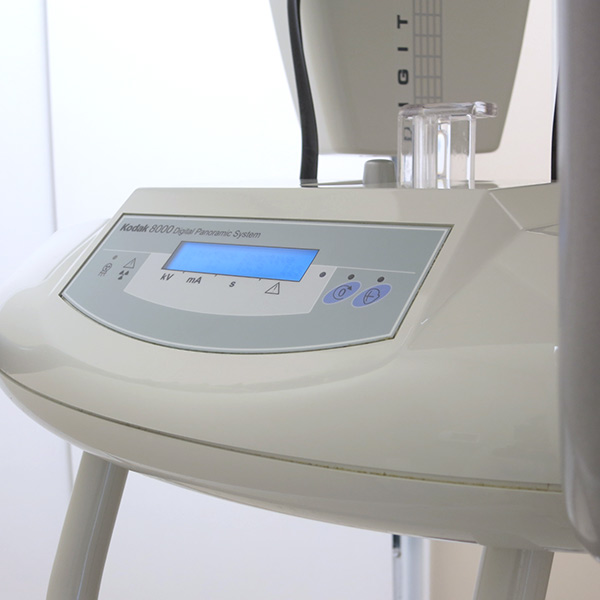
A crown is a cap which completely covers a tooth or dental implant. A crown can be made from porcelain, gold, alloys or a combination of these materials. Crowns are typically bonded to the teeth using a dental cement. Implant-supported crowns are typically attached to an implant with screws, or bonded with dental cement.
A bridge is used to fill a gap created by one or more missing teeth. A bridge is made up of three or more crowns splinted together. It is composed of crowns for the teeth on either side of the gap, and one or more false teeth in between to fill the gap.
An implant-supported bridge uses implants instead of teeth as the support for the missing tooth/teeth.
A bridge can be made from porcelain, gold, alloys or a combination of these materials.
Crowns are often used to improve the strength or appearance of teeth which may otherwise not able to support a filling. They are necessary when a tooth has a higher probability of fracture, has large existing fillings, or has had a root canal treatment. They are often used along with an dental implant to replace missing teeth.
A bridge is used to replace one or more missing teeth. A bridge can be supported by natural teeth or implants. For a tooth-supported bridge the missing teeth should have supporting teeth on both sides that are strong and (ideally) free from gum disease. An implant-supported bridge is usually used to replace multiple missing teeth in one area (three or more).





I got a PFM crown on my tooth #22, 12 months ago. After this crown I had some growth on my papilla and my tongue touches this upper wall of inside mouth and I get constant slimy feeling. I have got this checked from many dentists, nobody was able to cure this issue. One dentist advised to excise this palatal papilla.
Hi Farooq, unfortunately, it’s not possible to provide you with much insight regarding your crown without an actual physical examination. If the overgrown papilla is your main concern, a visit to a gum specialist (a periodontist) may help.
What should i do if my crown was broken?
Hi Dianara, unfortunately, I can’t really give you any advice without an in-person examination of your crown. Please consult a dentist as soon as possible to find out the cause and to prevent possible pain and tooth abscess.
I had a root canal done on my lower left 2nd molar, the endodontist recommended me to a crown specialist. The crown specialist prepped my tooth for a crown, took a mould to have the crown created and gave me a temporary crown in the meantime.
But he told me that before putting the permanent crown, he recommended that I go see a gum specialist for a gum surgery. Something about a small surgery that involves tearing the side of the gum open to shave a bit of the bone off. the reason being that if we didnt there would be a risk of gum infection later on.
I am trying to find out whether such a procedure is common during root canal treatment?
Hi RK, the gum surgery recommended to you is called a crown lengthening procedure. Without an examination it’s not possible to speculate on exactly why the procedure was recommended for you, but in cases where the decay is far below the gum line we may recommend a crown lengthening procedure. This is because the crown must be placed even deeper under the gum line to cover it, close to the bone. Over time, the close proximity of crown to the bone can potentially cause gum irritation or infection. It is a relatively common procedure, but not necessary for all crowns.
Hi Dr Li, enamel has worn away on front teeth (at the back) due to deep bite. What is best treatment for this? Which are the better options, veneers or crowns and how can I correct bite. Have no pain.
Thanks.
Hi Glenda, crowns are typically used to restore worn teeth. Veneers are typically used to cover only the front surface of the teeth, so they won’t be very useful for your situation. Prior to crown placement there may be a need for root canal treatment, gum surgery (to remove some bone and gum so the crown can be placed in a position to correct the deep bite), or braces (to correct the deep bite). The treatment(s) you need depend on how much the teeth are worn, how severe the deep bite is and the gum condition of those teeth. Please consult a dentist regarding the best treatment option(s) for your situation.
I had a root canal on my 26 I going to place a porcelain crown over it. My question is do I require a post I would rather not put the post in it just the porcelain crown and it’s not porcelain fused to metal.
Hi Danny, whether you need a post or not depends on how much natural tooth structure is still present in your tooth. If the majority of the tooth structure has been lost to cavities, then a post is needed to help support the filling (the core) which will then help support the crown. If not, there is a higher chance of the crown breaking off of the tooth. You will need to talk to the dentist who is doing the crown to see if you need a post or not.
Is there a way a dentist can build up a tooth with bonding or something if it’s too small for a crown?
Thanks.
Hi Tammy, it is always possible to build up a tooth with a filling. However, if the tooth is too small or too broken down for a crown, a filling build on such a weak foundation may not last longer than the first time you bite into something. You will have to consult with your dentist to determine whether that is the case for your tooth.
Hello. I recently got one porcelain crown, can i drink alcohol?
Thank you
Hi John, alcohol should not cause any damage to a porcelain crown.
Depending on the type of cement used, your dentist may recommend not eating or drinking for a short period of time (half an hour to a couple of hours) right after cementing the crown. Once the cement is completely set, you should be able to resume eating and drinking normally.
I just had a new bridge inserted on the left side -it required a mould -the mould on removal pulled out another older bridge on the right side-I do not of course want a repeat of this situation and have the new bridge compromised-in your opinion is a complete mould required for a proper bite or is there an alternative- eg mould only the immediate area ,use the mould from the new bridge ,photography or another method. ? Your advice would be most appreciated-thank you
Hi Robert, whether or not a complete mould is needed depends on many factors such as what your original bite is like, how long the bridge is, and which teeth are involved. In general, a complete mould will give the dental lab more information to work with and is more likely to give your new bridge a proper bite. However, you can possibly get away with a partial mold involving only one side in some cases.
In general, it is very unlikely for a mould to pull off a bridge, unless it is already weakened with cavities underneath or if the cements used are getting older and the bond strength has weakened over the years due to wear. The chance of a new bridge to come off with a mould is even more unlikely. If you are concerned, discuss the option of partial mold with your dentist when you get the new bridge made.
Is it possible to have a front full metal dental bridge?
Hi Asia, although it is not often done, it is possible to have a metal dental bridge for your front teeth. You will want to discuss with your dentist to find out if the dental lab he or she works with can make the type of bridge you are looking for. Price for a full gold bridge will be much higher than a porcelain covered metal bridge because of the higher pricing of gold.
Hello!
I got 2 crowns done on my bottom teeth 2 days ago. The dental assistant pushed very hard on my jaw when putting the temporary crowns in, she did not tell me to clench my jaw when she did this. It really hurt when she did this and I was frozen at the time. Now 3 days later my jaw still hurts even when it is closed. It hurt to eat and I have trouble sleeping. I’m taking pain meds but it does not seem to get better only worse. Should I see a doctor? Is this normal? Thank you!
Hi Emma, If you are having trouble sleeping due to the pain and pain medication is not helping, please consult with your dentist as soon as possible.
Dr. Qin Li,
I’m waiting for bridge in the coming days but one supporting tooth is very sensible and hurt hard when taking cold or sour drinks or when touched ?
The supporting teeth were already prepared in the first day.
Should I be concerned about this hurting tooth ? is this normal ?
Thanks in advance.
Hi, without an in-person examination it is impossible for me to tell you if the pain is normal, but my suggestion is to let your dentist know as soon as possible.
I was at my dentist and mentioned I was thinking about getting a crown on one of my front top 2 teeth which had a root canal and he advised against it since the tooth was mostly made from the hard plastic or whatever and wouldn’t be that strong, but i still think I want it cause it doesn’t really look attractive as it is. Should I just ask for it to be done? Any advise would be nice.
Hi Sean, there are times when we advise against a crown due to various reasons, such as the reason your dentist gave. If you still want to go ahead with it, you need to know the potential risks before you make the final decision. Ask your dentist if you may end up losing the tooth faster if you were to go ahead with the crown, and if so, what your options and financial obligations would be. It will help with your decision making to know all the facts.